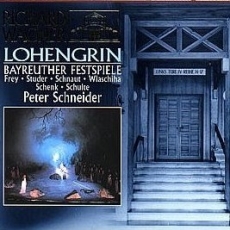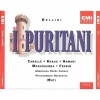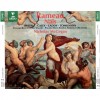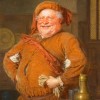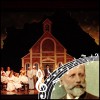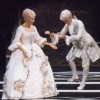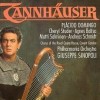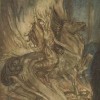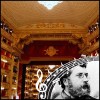Libretto
Lohengrin is a romantic opera in three acts composed and written by Richard Wagner, first performed in 1850. The story of the eponymous character is taken from medieval German romance, notably the Parzival of Wolfram von Eschenbach and its sequel, Lohengrin, written by a different author, itself inspired by the epic of Garin le Loherain. It is part of the Knight of the Swan tradition.
The opera has proved inspirational towards other works of art. Among those deeply moved by the fairy-tale opera was the young King Ludwig II of Bavaria. 'Der Märchenkönig' ('The Fairy-tale King') as he was dubbed later built his ideal fairy-tale castle and dubbed it "New Swan Stone," or "Neuschwanstein," after the Swan Knight. It was King Ludwig's patronage that later gave Wagner the means and opportunity to build a theatre for, compose and stage his epic cycle, the Ring of the Nibelung.
Several excerpts have become famous, including the preludes to the first and third acts, the opening music to Act II, Scene 4, which has been converted into the concert band piece "Elsa's Procession to the Cathedral", Lohengrin's aria In fernem Land (Act III, Scene 3), and the Bridal Chorus "Treulich geführt" from Act III, Scene 1 – commonly known as "Here Comes the Bride."
Synopsis
Place: Antwerp, on the Scheldt.
Time: 10th century
Act 1
King Henry the Fowler has arrived in Brabant where he has assembled the German tribes in order to expel the Hungarians from his dominions, and to settle a dispute between two of his subjects. These are Count Telramund, who acts as regent and guardian for the child Duke Gottfried of Brabant, against the young Duke's sister, Elsa. Gottfried has mysteriously disappeared and Telramund, incited by his manipulative wife Ortrud, accuses Elsa of murdering her brother and demands that she give him the dukedom.
Elsa appears, surrounded by her attendants. Knowing herself to be innocent, she declares that she is willing to submit to the judgment of God through the ordeal of combat. Telramund agrees enthusiastically. When the King asks who shall be her champion, Elsa describes a knight she has beheld in her dreams (Narrative: "Alone in dark days") and sinks to her knees, praying for God to send her relief.
Twice the Herald calls upon the unknown knight in vain; however, when Elsa calls herself, a miracle occurs. A boat drawn by a swan appears on the river and in it stands a knight in shining armour. He lands and dismisses the swan before respectfully greeting the king and asks Elsa if she will have him as her champion. Elsa kneels in front of him and places her honour in his keeping. He asks but one thing in return for his service: she is never to ask him who he is or where he has come from. Elsa agrees to this. Telramund's people advise him to withdraw because he cannot win against magic, but Telramund proudly refuses to back down, and the combat area is prepared. The company prays to the one "Herr und Gott" for victory for the fighter whose cause is just. Ortrud does not join the prayer because she is a member of the pre-monotheistic pagan religion, which the ruling monotheists tolerate (unwisely, as it turns out). The combat commences. Telramund loses, but the mysterious knight grants him his life. Taking Elsa by the hand, the unknown knight declares her innocent and asks for her hand in marriage. The crowd exits, cheering and celebrating, and Ortrud and Telramund are left to lament their defeat.
Act 2
Night in the courtyard outside the cathedral. Telramund and Ortrud, both banished, listen unhappily to the distant party-music. Ortrud, a heathen witch (pre-monotheist pagan), daughter of Radbod, the Duke of Frisia, tries to revive Telramund's courage, assuring him that her people (and he) are destined to rule the kingdom again. She plots to induce Elsa to violate the mysterious knight's only condition.
When Elsa appears on the balcony in the twilight before dawn, she hears Ortrud lamenting and takes pity upon her. While Elsa descends to open the castle door, Ortrud prays to her pagan gods, Wodan and Freija, for malice, guile, and cunning, in order to deceive Elsa and restore pagan rule to the region. When Elsa appears, Ortrud warns her that since she knows nothing about her rescuer, he could leave her any time, as suddenly as he came.
The populace assembles and the Herald announces that the king has offered to make the unnamed knight the Duke of Brabant; however, the Knight has declined the title, and prefers to be known only as "Leader [Führer] of Brabant", or, in post-WWII performances, "Guardian [Schützer] of Brabant". The Herald further announces that the Knight will lead the people to glorious new conquests. Four knights quietly express misgivings to each other; Telramund secretly assures them that he will stop the Knight, by accusing him of witchcraft.
As the king, the Knight, Elsa and her attendants are about to enter the church, Ortrud, clad in magnificent attire, appears and accuses the Guardian of Brabant of being a magician. Telramund also appears. He claims that his defeat in combat was invalid because the Knight did not give his name; trial by combat is traditionally open only to established citizens. The Knight refuses to reveal his identity and claims that only one has the right to know his origin – Elsa and Elsa alone. Elsa, though visibly shaken and uncertain, assures him of her confidence and they enter the church together.
Act 3
Johanna Jachmann-Wagner as Ortrud, ca. 1860The bridal chamber. Elsa and her new husband are ushered in with the well-known bridal chorus, and the couple express their love for each other. Ortrud's words, however, are impressed upon Elsa, and, despite his warning, she asks her husband the fatal question. Telramund and his four recruits rush into the room in order to attack the strange knight. Instead it is Telramund who is slain. The Knight sorrowfully turns to Elsa and asks her to follow him to the king, to whom he will now reveal the mystery.
Change of scene: On the banks of the Scheldt, as in Act I. The troops arrive equipped for war. Telramund's corpse is brought in and the stranger defends his slaying of Telramund. One thing remains – he must now disclose his identity to the king and Elsa. He tells the story of the Holy Grail, and reveals himself as Lohengrin, Knight of the Holy Grail and son of King Parsifal. The time for his return has arrived and he has only tarried to prove Elsa innocent.
As he sadly bids farewell to his beloved bride, the swan reappears. Lohengrin prays that Elsa may recover her lost brother; and indeed, the swan dives into the river and appears again in the form of young Gottfried, Elsa's brother, who had been turned into the swan by Ortrud's magic arts.
A dove descends from heaven, and, taking the place of the swan at the head of the boat, leads Lohengrin to the castle of the Holy Grail. Elsa is stricken with grief, however, and falls to the ground dead, longing for her beloved.





